| Srl | Item |
| 1 |
ID:
097759
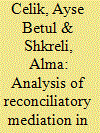

|
|
|
|
|
| Publication |
2010.
|
| Summary/Abstract |
Blood feuds are still festering wounds in northern Albanian society. This study will describe the process and the mechanisms utilised by traditional mediators in resolving blood feuds in northern Albania. It will describe the practice of mediation in northern Albania, and will discuss the reasons why people resort to traditional mediators in blood feuds, what their roles are in the process of mediation, forgiveness and achieving peace and what norms or values are used to influence the parties to make peace.
|
|
|
|
|
|
|
|
|
|
|
|
|
|
|
|
| 2 |
ID:
097761
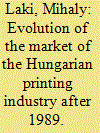

|
|
|
|
|
| Publication |
2010.
|
| Summary/Abstract |
This article examines a case study of one industry in order to explore the factors influencing changing performance levels in the industries of post-socialist economies. It explores the influence on industrial performance of a number of once-only non-repetitive factors of market development that were typical of the transition period and compares them with longer term aspects of the market economy. The case that we discuss here is the development of the market for products of the Hungarian printing industry since the late 1980s. During the transition phase, privatisation, deregulation, the abolition of administrative distribution, and radical cuts in subsidies were all among the factors affecting this industry. Its supply chains also changed radically. However, these lost their importance after the transition had been completed and the long term processes of technical development and consumer behaviour became the main determinants of the behaviour of the printing companies.
|
|
|
|
|
|
|
|
|
|
|
|
|
|
|
|
| 3 |
ID:
097764


|
|
|
|
|
| Publication |
2010.
|
| Summary/Abstract |
Conceptualising Russia as a neopatrimonial state directs attention to the patrimonial relations that pervaded formal institutions to reveal increasing tensions within the state during Putin's presidency. A case study of parliamentary oversight practices points to the emergence of legitimation as their key purpose, but also to the growing contradictions between the controlling and legitimating impulses of Putin's regime. At the same time deputies responded to the changes in their status and influence by moving their resources towards the patrimonial sphere, most notably utilising oversight institutions for direct and indirect private interests-activities tolerated by the regime in exchange for political loyalty.
|
|
|
|
|
|
|
|
|
|
|
|
|
|
|
|
| 4 |
ID:
097763
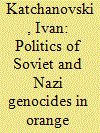

|
|
|
|
|
| Publication |
2010.
|
| Summary/Abstract |
This article examines policies and public attitudes concerning the issue of Soviet and Nazi genocides in Ukraine after the 'Orange Revolution'. The central question is whether such factors as regional political culture affect contemporary policies and public attitudes towards these important historical issues. The article uses a 2008 survey conducted for this study by the Kyiv International Institute of Sociology to analyse determinants of public attitudes concerning the question of whether Soviet and the Nazi policies were genocidal. It finds that regional political culture is the most significant factor affecting policies and attitudes towards the Soviet genocide in Ukraine.
|
|
|
|
|
|
|
|
|
|
|
|
|
|
|
|
| 5 |
ID:
097760
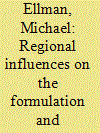

|
|
|
|
|
| Publication |
2010.
|
| Summary/Abstract |
The article provides an analysis of the regional input into NKVD order 00447, the deadliest of the 1937-1938 state terror attacks on the Soviet population. This regional input concerned the decision to establish regional troikas, the choice of the target groups, the size of the initial limits, the extension of the deadline for completing the operation, the relationship between the initial limits and the final number of victims, the relationship between the final limits and the final number of victims, the actual victims, and unauthorised terror. It is argued that the formulation and implementation of order 00447 was a dynamic process of interaction between the centre and the regions in which the regions played a significant, but subordinate, role.
|
|
|
|
|
|
|
|
|
|
|
|
|
|
|
|
| 6 |
ID:
097762
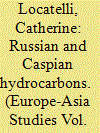

|
|
|
|
|
| Publication |
2010.
|
| Summary/Abstract |
The issue of EU gas supply security has become more and more important in the 2000s in the context of gas market liberalisation and the question of the reliability of Russia as a supplier. One answer to these problems is EU gas diversification, specifically the opening up of a fourth gas corridor to supply the EU with gas from Central Asia via the 'Caucasus' or 'southern' route. The feasibility of this strategy might now be called into question. This article reviews the new strategies that could emerge in the producing countries as well as those of international oil companies, and then examines what the consequences might be as far as the EU's diversification strategy is concerned. The article identifies some of the problems and limits of these strategies.
|
|
|
|
|
|
|
|
|
|
|
|
|
|
|
|